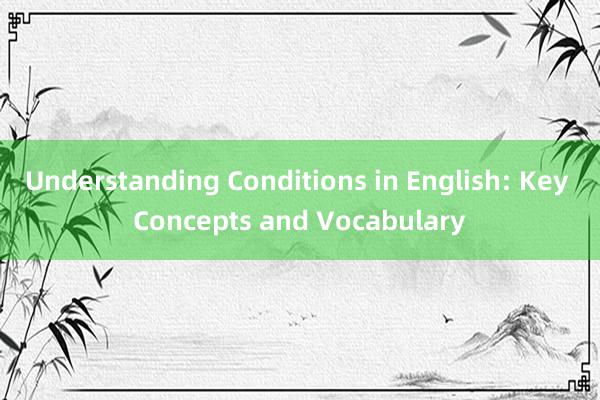时间:2024-09-06 19:24

### Understanding Conditions in English: Key Concepts and Vocabulary
In the realm of English language learning, mastering conditions is crucial for crafting nuanced and precise sentences. Conditions refer to the circumstances under which certain events or actions occur, often expressed through conditional clauses. This article aims to elucidate key concepts and vocabulary related to conditions in English, providing insights into how to effectively use these structures in your communication.
#### Conditional Sentences Explained
Conditional sentences are a type of sentence that expresses a condition or possibility. They are divided into three main types:
1. **Type 1 (Real Condition)**: This type describes a real or possible situation in the present or future.
- **Example**: If it rains tomorrow, I will stay at home.
2. **Type 2 (Unreal Condition)**: This type describes an unreal or unlikely situation, often used in hypothetical scenarios or wishes.
- **Example**: If I were rich, I would travel the world.
3. **Type 3 (Advice)**: This type gives advice based on a condition.
- **Example**: If you study hard, you will pass the exam.
#### Key Vocabulary and Phrases
To construct and understand conditional sentences effectively, here are some essential vocabulary and phrases:
- **If** introduces the condition.
- **Then**, **so**,山东省博兴县大程地毯有限公司 or **because** can follow to express the consequence or result of the condition.
- **Would**, 绍兴信日制线有限公司 **should**, 深圳达和公司 **could**, **might** are modal verbs used in Types 2 and 3 to express possibility or uncertainty.
- **Were** is used in Type 2 to indicate a past unreal condition.
- **Had** is used with **not** to express a past unreal condition in Type 2.
#### Common Conditional Phrases
Here are some common phrases used in conditional sentences:
- **If it rains**,北京理京软件技术 I’ll stay at home.
- **If I had time**, I’d go to the beach.
- **If you were to ask me**, I’d say yes.
- **If only I knew**, how to solve this problem!
#### Applying Conditions in Context
Understanding conditions in English allows for more dynamic and expressive writing and speaking. By using conditional sentences, one can articulate various scenarios, express opinions, and offer advice in a sophisticated manner. For instance, when discussing potential outcomes or expressing hypothetical situations, conditions provide a framework for exploring different possibilities and their implications.
#### Conclusion
Mastering conditions in English involves recognizing the different types of conditional sentences and utilizing appropriate vocabulary and phrases. Whether you're discussing real-life situations, contemplating hypothetical scenarios, or giving advice, understanding conditions enables you to convey complex ideas clearly and effectively. With practice北京理京软件技术, you'll be able to integrate these structures seamlessly into your English communication, enhancing both clarity and eloquence.